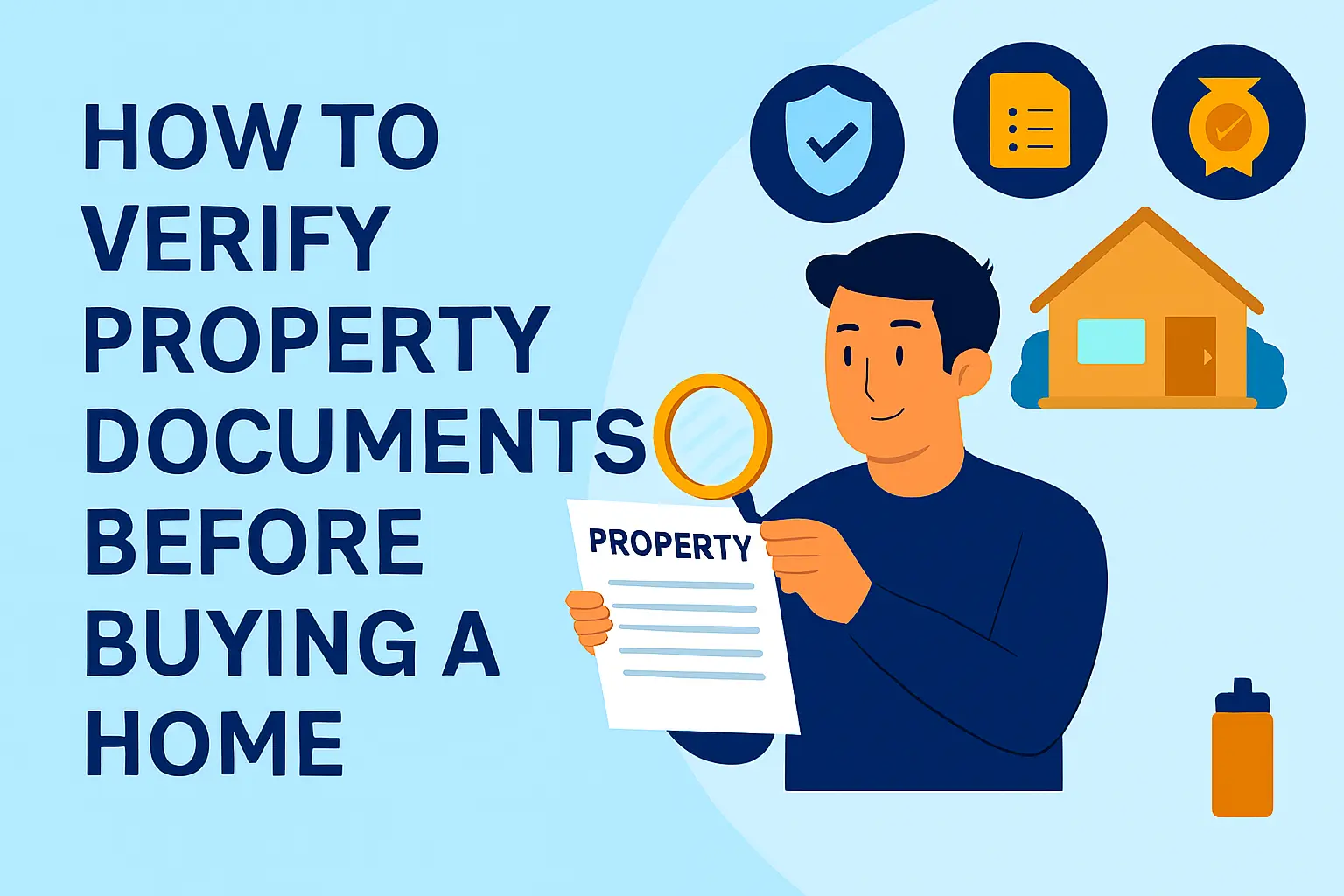Buying a home is one of the biggest investments you’ll make, and property document verification is essential to avoid disputes, financial losses, or scams. Many first-time buyers rush through the process and fail to verify property documents, putting themselves at risk. This comprehensive home buying checklist will guide you through the steps to properly verify property documents before buying a home, helping you make a safe and informed purchase. From checking title deeds to reviewing encumbrance certificates, we’ll cover all the essential documents and share tips to avoid property fraud. By following this guide, you’ll gain confidence in handling the legal side of home buying and ensure your investment is secure.

Table of Contents
Why Verifying Property Documents Is Essential
Property document verification ensures the seller has the legal right to sell the property and that it is free from disputes, liens, or encumbrances. Failing to understand how to verify property documents before buying a home can lead to legal battles, financial losses, or even loss of ownership. For instance, a property with unclear ownership or undisclosed loans could result in costly litigation. By thoroughly checking documents, you protect your investment and ensure a smooth transfer of ownership. This process is especially critical in countries like India, where property fraud is not uncommon due to complex land laws and incomplete records.
Essential Property Documents to Verify
Before signing any agreement, ensure you have access to and know how to verify property documents before buying a home. Each serves a specific purpose in confirming the property’s legal status.
1. Title Deed (Sale Deed or Conveyance Deed)
The title deed is the primary document proving the seller’s ownership of the property. It details the transfer of ownership from the previous owner to the current seller.
- What to Check:
- Ensure the title deed is in the seller’s name and matches their identity proof.
- Verify the document is registered with the local sub-registrar’s office.
- Check for any conditions, restrictions, or clauses that might affect ownership.
- Confirm the property description (e.g., boundaries, measurements) matches the actual property.
- How to Verify:
- Obtain a certified copy from the sub-registrar’s office.
- Consult a property lawyer to review the deed for authenticity and legal compliance.
2. Encumbrance Certificate (EC)
An encumbrance certificate confirms that the property is free from legal or financial liabilities, such as mortgages, loans, or pending litigation.
- What to Check:
- Look for any recorded liens, mortgages, or legal disputes over the past 12–30 years (depending on local requirements).
- Ensure no pending dues or claims exist against the property.
- How to Verify:
- Request the EC from the sub-registrar’s office or online portal (e.g., in India, through state-specific land record websites).
- Cross-check the EC with the title deed for consistency.
3. Property Tax Receipts
Property tax receipts prove that the seller has paid all municipal taxes on the property.
- What to Check:
- Ensure receipts are up-to-date and in the seller’s name.
- Verify there are no outstanding tax dues.
- How to Verify:
- Obtain receipts from the seller or check with the local municipal corporation.
- Cross-reference the property details (e.g., address, plot number) with the title deed.
4. No Objection Certificate (NOC)
An NOC from relevant authorities (e.g., housing society, municipal corporation, or banks) confirms there are no objections to the property’s transfer.
- What to Check:
- Confirm NOCs from all relevant parties, such as the housing society, developer, or lender (if the property was under a loan).
- Check for compliance with local zoning or development regulations.
- How to Verify:
- Request original NOCs from the seller.
- Verify their authenticity with the issuing authority.
5. Approved Building Plan
For constructed properties, the approved building plan ensures the structure complies with local regulations and was built legally.
- What to Check:
- Confirm the plan is approved by the local municipal authority or development board.
- Compare the approved plan with the actual construction to identify unauthorized additions.
- How to Verify:
- Obtain a copy from the seller or municipal office.
- Engage a civil engineer or architect to verify compliance.
6. Occupancy Certificate (OC)
An occupancy certificate confirms that the property is ready for habitation and complies with building codes.
- What to Check:
- Ensure the OC is issued by the local authority.
- Verify it covers the specific property or unit you’re purchasing.
- How to Verify:
- Request the OC from the seller or developer.
- Check with the issuing authority for authenticity.
7. Khata Certificate and Extract (India-Specific)
In India, the Khata certificate and extract confirm the property’s registration with the municipal authority and its tax assessment details.
- What to Check:
- Ensure the Khata is in the seller’s name and matches property details.
- Verify there are no discrepancies in property measurements or ownership.
- How to Verify:
- Obtain from the local municipal office or online portal.
- Cross-check with property tax receipts and title deed.
8. Power of Attorney (If Applicable)
If the seller is acting on behalf of the owner via a power of attorney (POA), verify the POA’s authenticity.
- What to Check:
- Confirm the POA is registered and grants the seller authority to sell.
- Check for any limitations or conditions in the POA.
- How to Verify:
- Review the POA document with a lawyer.
- Contact the original owner (if possible) to confirm the arrangement.
9. Land Use Certificate
This document confirms the property’s designated use (e.g., residential, commercial) as per local zoning laws.
- What to Check:
- Ensure the property’s current use matches the certificate.
- Verify no zoning violations exist.
- How to Verify:
- Obtain from the local planning or development authority.
- Cross-check with the approved building plan.
10. Release Certificate (If Applicable)
If the property was under a mortgage, a release certificate confirms the loan has been fully repaid.
- What to Check:
- Ensure the certificate is issued by the lender.
- Verify it mentions the property in question.
- How to Verify:
- Request from the seller or contact the lender directly.
Step-by-Step Guide to Verify Property Documents
Follow these steps to systematically learn how to verify property documents before buying a home and minimize risks:
- Engage a Property Lawyer:
- Hire a qualified real estate lawyer to review all documents for legal compliance and authenticity.
- They can identify discrepancies or red flags that may not be obvious to a layperson.
- Request Original Documents:
- Ask the seller for original copies of all relevant documents.
- Avoid proceeding if the seller provides only photocopies or incomplete documents.
- Cross-Check with Authorities:
- Visit the sub-registrar’s office, municipal corporation, or other relevant authorities to verify document authenticity.
- Use online portals (if available) for quick checks, such as land records or ECs.
- Conduct a Title Search:
- Perform a title search to trace the property’s ownership history and ensure a clear title.
- This can be done through a lawyer or title search agency.
- Verify Property Measurements:
- Physically measure the property or hire a surveyor to confirm its dimensions match the documents.
- Check for encroachments or boundary disputes.
- Check for Pending Litigation:
- Investigate if the property is involved in any legal disputes by checking court records or the EC.
- Consult local authorities or neighbors for additional insights.
- Review Loan Status:
- Confirm the property is free from mortgages or loans by checking the EC and obtaining a release certificate (if applicable).
- Consult Local Experts:
- Engage a local real estate agent or surveyor familiar with the area to identify potential issues, such as disputed land or zoning violations.
- Double-Check Developer Credentials:
- If buying from a developer, verify their reputation, past projects, and legal compliance.
- Check for RERA (Real Estate Regulatory Authority) registration in countries like India.
- Get Everything in Writing:
- Ensure all agreements, including the sale agreement, are documented and registered.
- Avoid verbal promises or informal arrangements.
Common Red Flags to Watch For
Be cautious of the following warning signs during document verification to master how to verify property documents before buying a home:
- Incomplete or Missing Documents: If the seller cannot provide originals or key documents like the title deed or EC, it’s a major red flag.
- Discrepancies in Details: Mismatches in property measurements, ownership names, or addresses indicate potential fraud.
- Unregistered Documents: Unregistered title deeds or POAs may not be legally valid.
- Pending Dues or Liens: Outstanding taxes, loans, or litigation can complicate ownership transfer.
- Overly Eager Sellers: Sellers pushing for quick deals without proper documentation may be hiding issues.
Tips to Avoid Property Fraud
- Work with Reputable Professionals: Hire trusted lawyers, agents, and surveyors to guide you through the process.
- Avoid Cash Transactions: Use traceable payment methods like bank transfers to maintain a paper trail.
- Visit the Property: Physically inspect the property and talk to neighbors to uncover any disputes or issues.
- Check Developer Background: Research the developer’s track record, especially for new constructions.
- Use Government Portals: Leverage online land record systems (e.g., Bhulekh or Dharani in India) for quick verification.
- Take Your Time: Don’t rush the process, even if pressured by the seller or agent.
For more insights on global real estate trends, check out our article on Future of Real Estate Investment: International Hotspots to Watch.
SEO Package for the Article
To ensure this article ranks well on search engines, the following SEO strategies are implemented to teach you how to verify property documents before buying a home:
- Primary Keyword: “How to Verify Property Documents Before Buying a Home” (used in title, H1, meta description, and throughout the article).
- Secondary Keywords: “property document verification,” “essential documents for home buying,” “check property papers,” “avoid property fraud,” “home buying checklist.”
- Meta Description: “Learn how to verify property documents before buying a home to avoid scams and legal issues. Follow our step-by-step guide to check title deeds, ECs, and more!” (134 characters)
- Internal Linking: Link to related articles, such as “Home Buying Tips,” “Common Real Estate Scams,” or “RERA Guidelines for Homebuyers.”
- External Linking: Reference authoritative sources like government land record portals or RERA websites for credibility.
- Content Structure: Use clear H2 and H3 headings, bullet points, and numbered lists for readability and SEO.
- Keyword Density: Maintain a natural keyword density of 1–2% for primary and secondary keywords.
- Alt Text for Images: Use descriptive alt text, e.g., “Checklist for verifying property documents before buying a home.”
- Mobile Optimization: Ensure the article is formatted for mobile readability with short paragraphs and clear headings.
- Call to Action: Encourage readers to bookmark the guide or consult a lawyer for personalized advice.
For professional guidance, visit National Association of Realtors for additional resources.
FAQ: Verifying Property Documents Before Buying a Home
1. Why is it important to verify property documents before buying a home?
Verifying property documents ensures the seller has legal ownership, and the property is free from disputes, loans, or liens, protecting you from fraud and financial losses.
2. What is the most critical document to check when buying a home?
The title deed is the most critical, as it proves the seller’s ownership and details the property’s transfer history.
3. How can I check if a property has a clear title?
Obtain an encumbrance certificate (EC) from the sub-registrar’s office and conduct a title search through a lawyer or agency to confirm a clear title.
4. What should I do if the seller doesn’t provide original documents?
Avoid proceeding with the purchase. Insist on original documents, and consult a lawyer to verify their authenticity.
5. Can I verify property documents online?
In many regions, yes. Use government portals like Bhulekh, Dharani, or state-specific land record websites to check documents like ECs, Khata, or tax receipts.
6. How long does it take to verify property documents?
The process can take 1–4 weeks, depending on the complexity, availability of documents, and cooperation from local authorities.
7. What is an encumbrance certificate, and why is it important?
An encumbrance certificate (EC) shows whether the property has any legal or financial liabilities, such as mortgages or disputes, ensuring a clean transfer of ownership.
8. Should I hire a lawyer to verify property documents?
Yes, a qualified property lawyer can identify legal issues, verify document authenticity, and ensure compliance with local laws.
9. What happens if I buy a property with pending litigation?
You may face legal battles, financial liabilities, or loss of ownership. Always check the EC and court records to avoid such properties.
10. How can I avoid property fraud when buying a home?
Hire professionals, verify all documents with authorities, avoid cash transactions, and take time to thoroughly investigate the property’s history.
Conclusion
Verifying property documents before buying a home is a non-negotiable step to safeguard your investment and avoid legal or financial complications. By carefully checking documents like the title deed, encumbrance certificate, and property tax receipts, and following a systematic verification process, you can ensure a secure purchase. Engage professionals, use government portals, and stay vigilant for red flags to protect yourself from fraud. With this guide on how to verify property documents before buying a home, you’re equipped to navigate the home-buying process with confidence and peace of mind. For personalized advice, consult a real estate lawyer or local expert before finalizing your purchase.
For additional tips, explore our Top Tips for First-Time Homebuyers in 2025-26.
Disclaimer
This article is for general information only and isn’t legal, financial, or professional advice. Checking property documents can be complicated and rules can differ depending on your area or country. It’s always best to talk to a qualified real estate lawyer or professional before buying any property. The author and publisher aren’t responsible for any mistakes or issues that might come up from using this information. Make sure to do your own research and get professional guidance to stay safe when buying a home.


